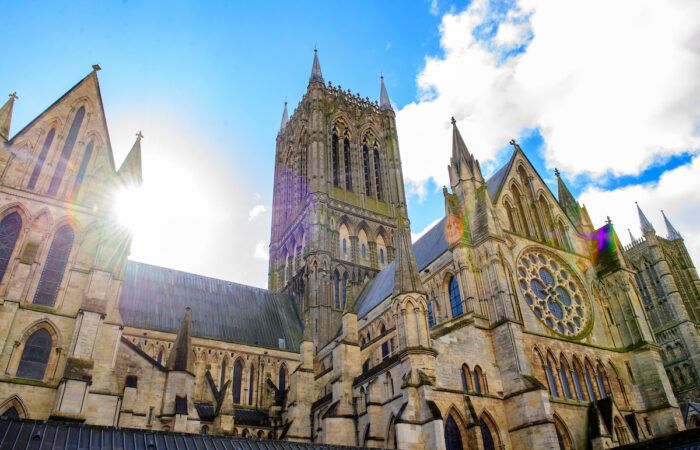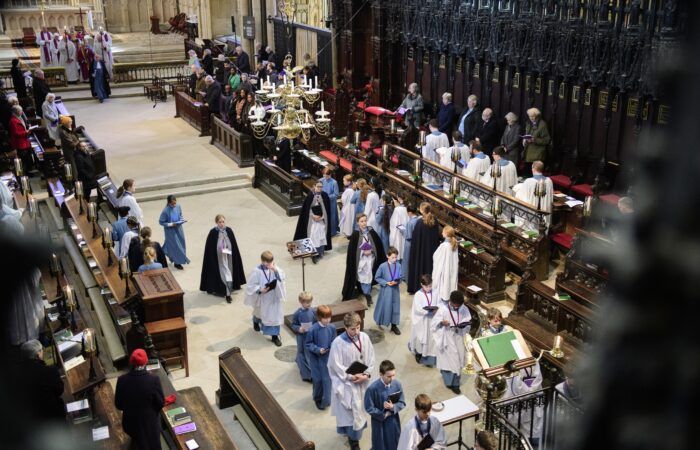A sermon by the Very Reverend Christine Wilson to mark the first Sunday of Lent
How are you getting on with your observance of Lent?
Have you given something up for Lent?
Or maybe resolved to do something as part of your spiritual discipline in these 40 days of fasting, prayer and self-denial?
I always find that one of the traps of this penitential season is to regard it as an opportunity for self-improvement. Giving up chocolate or alcohol is undoubtedly good for me. It can remind us of our hunger pangs for spiritual nourishment.
But it can also be motivated by the opportunity to lose weight and feel healthier.
More time spent in spiritual reading or in silence will give valuable input and time to listen more deeply to God.
It is also likely to improve our mental equilibrium and re-balance the busyness of our lives.
Of course the two are not exclusive and God is concerned for our physical, mental and spiritual health.
But, there is always a temptation to simply replace one sort of self-indulgence with another?
The enjoyment of a glass of wine is replaced with the delight of the needle on the scales going down.
What is the purpose of Lent and what does God really desire from us in these 40 days?
On Ash Wednesday we heard the prophet Joel saying: Return to me with all your heart, with fasting and weeping and mourning.
When Joel uttered those words it was not so much an appeal for individual and personal soul searching. It was a call to the whole people of God to seek the reset button and re-orientate their lives towards a renewed relationship with their ever- patient, ever- faithful Lord.
In the Book of Joel warnings of devastation come thick and fast.
Swarms of Locusts, drought, famine, anguish and destruction.
All the classical signs in the Bible of Gods wrath and indignation.
The people are given a choice.
Choose: Between death and life. Between darkness and light. Between suffering and joy.
All of this dramatic divine activity is the background to the invitation to return to the Lord.
It is an invitation we hear time and time again in the Old Testament as God resolutely and passionately reaches out to a rebellious people.
This morning, in the passage from the story of Noah we have the finale of an earlier piece of dramatic theophany. God has annihilated his Creation, saving just one family and the animals in the ark.
We hear an account of utter devastation. The waters of the great flood drowning a corrupt and wicked world.
But the final outcome of this terrifying story is a commitment on the part of God to life and blessing.
God makes an everlasting pledge of faithfulness towards us, and every living thing.
Throughout the Old Testament there is this repeat of turning away from God, warnings of calamity and disaster and then scenes of reconciliation. We are given an image of a God who relents and is merciful and keeps faith with us. Covenants are made with Abraham, with Moses and with David. Prophets are sent to call the people back to God.
And there is a dependence on the side of God to keep on demonstrating forgiveness.
Our Gospel this morning heralds a new and radical change in the relationship between God and us. This new way revealed in the ministry of Jesus which is inaugurated through baptism.
The link between the flood waters of the Noah story and the waters of baptism is not to missed here. A deluge of water comes before the ending of God’s wrath and destruction as a response to wickedness. Immersion in the water of baptism reveals the beginning of a new relationship with God.
Jesus of course doesn’t need to establish this new relationship since he is the beloved Son. But he submits to it as a sign of the new way that is being initiated through him.
As his ministry begins at the river Jordan Jesus announces: “The time is fulfilled, and the kingdom of God has come near: repent and believe the good news.
This offer of a new relationship starts with repentance and a decision to turn away from sin and embrace the way of God revealed in Jesus Christ. So no more covenants, no more pledges, no more rejected Prophets – but rather the gift of God’s Son and the choice to follow and imitate him.
It echoes the words we received on Ash Wednesday: “turn away from sin and be faithful to Christ”.
The response to human wickedness is no longer threats of disaster, destruction, death dealing and annihilation. It is the promise and choice of life through Christ.
But not only are we are invited to choose life rather than destruction, and offered a path to forgiveness and reconciliation with God, we have this extraordinary call to share in the ongoing work of Christ in the world.
We are invited to be a part of that out pouring of life and blessing towards all creation and every living thing: to be the enactors of the ongoing story of God’s love and faithfulness.
So, I asked at the beginning what is Lent for?
What does the Lord require of us?
How are we to use these 40 days –36 now!
Joel gives the message: Return to me with all your heart, with fasting and weeping and mourning.
Christ invites us to “repent and believe in the good news.”
For Christians today a challenge is to make faith believable. Not because people are more secular or more on the side of atheism, but because those looking in question the authenticity of what we profess. They look for the evidence of genuine practice of faith and find it wanting.
They see a church that fails to be radically inclusive. A church that directs too much energy to internal disagreements. A church that often appears silent in the face of injustice.
Pope Francis has suggested that we should make a fast and repent of our indifference:
He writes; Whenever our interior life becomes caught up in its own interests and concerns, there is no longer room for others, no place for the poor. God’s voice is no longer heard, the quiet joy of his love is no longer felt, and the desire to do good fades.”
This is what he believes Lent is for- he says: “Lent comes providentially to reawaken us, to shake us from our lethargy.”
This week’s chapter letter explores a few ideas of how we might make small incremental steps to make a difference and contribute to the flourishing and well-being of every living creature.
Yesterday we held a modern slavery summit to raise awareness to the exploitation and enslavement of the vulnerable and to challenge us to consider our consumer choices and demand for cheap goods and services.
Lent gives us another opportunity to re-align ourselves with the purposes of God: To be less pre-occupied with our own needs and concerns. To make room in our hearts for others – especially the poor and the vulnerable. To listen to God. To share the quiet joy of his love. And be renewed in our longing to do good.
For then, after the 40 days, when we come to Easter and the renewal of our baptismal vows, with the sign of water, the sprinkling of holy water will confirm afresh that we choose to turn away from sin we choose the way of Christ, we choose to take hold of the life that really is life and we choose to hear Christ’s commission to share that life and blessing with every living creature on earth.

